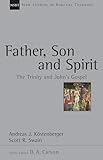Father, Son, and Spirit : the Trinity and John's Gospel / Andreas J. Kostenberger and Scott R. Swain.
Material type: TextSeries: New studies in biblical theology (InterVarsity Press) ; 24.Description: 224 pages ; 22 cmContent type:
TextSeries: New studies in biblical theology (InterVarsity Press) ; 24.Description: 224 pages ; 22 cmContent type: - text
- unmediated
- volume
- 9780830826254
- 9781844742530
- BS2615.52.K99.F384 2008
| Item type | Current library | Collection | Call number | Status | Date due | Barcode | |
|---|---|---|---|---|---|---|---|
 Circulating Book (checkout times vary with patron status)
Circulating Book (checkout times vary with patron status)
|
G. Allen Fleece Library CIRCULATING COLLECTION | BS2615.52.F384 2008 (Browse shelf(Opens below)) | Available | 31923002052013 | |||
 Circulating Book (checkout times vary with patron status)
Circulating Book (checkout times vary with patron status)
|
G. Allen Fleece Library CIRCULATING COLLECTION | Non-fiction | BS2615.52.S971.F384 2008 (Browse shelf(Opens below)) | Available | 31923001807110 | ||
 Circulating Book (checkout times vary with patron status)
Circulating Book (checkout times vary with patron status)
|
G. Allen Fleece Library CIRCULATING COLLECTION | Non-fiction | BS2615.52.K665 2008 (Browse shelf(Opens below)) | Available | 31923001529763 |
Browsing G. Allen Fleece Library shelves, Shelving location: CIRCULATING COLLECTION Close shelf browser (Hides shelf browser)

|
No cover image available |

|

|
No cover image available |

|

|
||
| BS2595.5.N17 A NavPress Bible study on the book of Luke. | BS2596.G4 1947 How to study Luke / | BS2596.L85 1992 Luke : new hope, new joy : 26 studies in 2 parts for individuals or groups / | BS2615.52.F384 2008 Father, Son, and Spirit : the Trinity and John's Gospel / | BS2626.G4 How to study Acts /by Joseph M. Gettys. | BS2626.W345 1977 Studies in Acts : a student book for thirteen weeks of study / | BS2635.J6 1973 Life in the heights : studies in the epistles / |
From the patristic period until today, John's Gospel has served as a major source for the church's knowledge, doctrine, and worship of the triune God. Among all New Testament documents the Fourth Gospel provides not only the most raw material for the doctrine of the Trinity, but also the most highly developed patterns of reflection on this material - particularly patterns that seek to account in some way for the distinct personhood and divinity of Father, Son and Spirit without compromising the unity of God. While there have been recent, fine studies on aspects of John's doctrine of God, it is surprising that none summarizes and synthasizes what John has to say about God as Father, Son, and Holy Spirit. In order to fill this gap, Kostenberger and Swain offer a fresh examination of John's trinitarian vision. Part One situates John's trinitarian teaching within the context of Second Temple Jewish monotheism. Part Two examines the Gospel narrative in order to trace the characterization of God as Father, Son and Spirit, followed by a brief synthesis. Part Three deals more fully with major trinitarian themes in the Fourth Gospel, including its account of Jesus Christ, the Holy Spirit, and mission. A final chapter discusses the significance of John's Gospel for the church's doctrine of the Trinity, and a brief conclusion summarizes some practical implications. - Publisher.
Introduction: John's Gospel and the church's Doctrine of the Trinity -- The approach of the present study -- Historical context -- John's Gospel and Jewish monotheism -- John's context -- John's portrayal of Jesus and Jewish monotheism -- The background of John's portrayal of Jesus' pre-existence -- Christ-devotion and exclusivist Jewish monotheism -- Implications for John's Gospel -- Biblical foundations -- God in John's Gospel -- The book of signs -- The book of glory -- The Father in John's Gospel -- The book of signs -- The book of glory -- The son in John's Gospel -- One-of-a-kind son -- Son of God -- Son of man -- The son -- The spirit in John's Gospel -- The book of signs -- The book of glory -- Father, Son and Spirit in John's Gospel -- Theological reflections -- Christology in John's trinitarian perspective : Jesus' filial identity -- The prologue : John's initial characterization of Jesus as the Son -- Jesus' filial identity and divine agency -- Jesus' filial identity and the nature of salvation -- The spirit who rests and remains on God's son and his brothers -- John's initial characterization of the spirit in relation to Jesus : book of signs -- Initial summary : Jesus and the spirit in the book of signs -- John's Fuller characterization of the spirit in relation to Jesus and the disciples : book of glory -- The spirit who rests and remains on God's son and his brothers -- Father, Son and Spirit -- 'As the Father has sent me, so I am sending you' : toward a trinitarian mission theology -- God (theos) -- The Father -- The Son -- The Spirit -- Father, Son and Spirit : the three persons of the Godhead united in one mission -- The Trinity and the church's mission -- The Trinity and John's Gospel -- John 17 : Jesus' high-priestly prayer -- Immanent and economic Trinity -- Conclusion: The gift of life : knowing the Triune God.
Current Copyright Fee: GBP17.50 0. Uk
There are no comments on this title.
